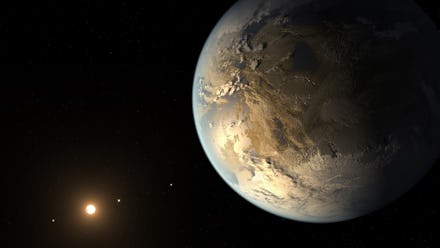Scientists May Have Figured Out How to Speak to Aliens — And Here's What It Sounds Like

If humans were to make contact with an intelligent alien species, they would be interested in one thing: our music.
David Grinspoon, the principal scientist at the Planetary Science Institute, and Ka Chun Yu, the Denver Museum of Nature and Science's curator of space science, believe that alien species wouldn't care about our technology, our literature or our precious resources. They'd want to communicate, and the most likely way to do so is through music. That's why Grinspoon and Yu formed the House Band to the Universe.
Though the question of whether aliens listen to music might sound more like it came from a stoned teenager listening to Pink Floyd than an astrophysicist, the idea of speaking to martians through music was first formally proposed in 2010, during a conference for the members of the Search for Extraterrestrial Intelligence Institute, better known as SETI. There it was concluded that musical compositions, which are based on mathematical patterns, could be appreciated by an alien civilization — just another indication that music, above all else, is a truly universal language.
"The people who think about alien civilizations and write papers about it, they're technologists and scientists who wonder what kind of tech and science they'll have," Grinspoon told Motherboard. "We always picture this dream where the information we learn from aliens would be in physics and math. Well, maybe it'd be music."
Based on functional magnetic resonance imaging (fMRI) and various studies mapping the brains of music listeners, we already know that music speaks to humans on a fundamental emotional level that more closely resembles language than anything else. We process music as if it were an emotionally charged conversation. The thought here is that music would appeal to aliens, too. And it actually makes a lot of sense.
Studies on music's role as language also suggest that each genre of music expresses a unique intimate emotion, which is why Grinspoon and Yu carefully crafted their message to aliens, a mellow and psychedelic blend of jazz and funk with a tinge of African and Jamaican inspiration, or what NASA has dubbed "psychoastrobiofunkiliscious."
"There's beauty not just on Earth but elsewhere, in places humans have never been. It makes me wonder if extraterrestrials think it's beautiful, and if they have an appreciation of beauty," said Grinspoon. "I think they really do. What really interests me about the question is it makes us consider some aspects of ourselves. What if art is a response to being conscious within the universe? Do they respond in the same way we do?"
The astrobiologists took their intergalactic show to a whole other level this week with the incorporation of digital scientific visualizations and spoken word astrobiology lessons. It's good to know that they're practiced for if — when — an invading alien force comes knocking.